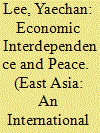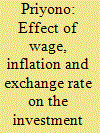|
|
|
Sort Order |
|
|
|
Items / Page
|
|
|
|
|
|
|
| Srl | Item |
| 1 |
ID:
162647


|
|
|
|
|
| Summary/Abstract |
Liberalists have argued that increased economic interdependence will deter the likelihood of war as opportunity costs of a military conflict will not be fashionable for either side. Realists such as Waltz contended that while interdependence promotes peace to a certain extent, it also multiplies the occasions for conflicts. Dale Copeland drew perspectives from both sides to argue that interdependence may lead to peace depending on the expectations of the future trade environment. Now, with the United States’ (US) ongoing trade war with China and its legacy of trade conflicts with Japan in the 1990s, the question of whether economic interdependence brings peace deserves to be revisited. This article, through making a comparison between the cases of bilateral trade conflicts between the US and China and the US and Japan, contends that increased bilateral economic interdependence also increased the frequency of conflicts in the two respective cases. Moreover, it further argues that such increase in frequency was due to the US’s negative expectations on the future trade environment.
|
|
|
|
|
|
|
|
|
|
|
|
|
|
|
|
| 2 |
ID:
162650


|
|
|
|
|
| Summary/Abstract |
The purpose of this study is to know and analyze the effect of wage variables on regional investment policy, the influence of inflation variables on regional investment policy, and the influence of exchange rate variables on investment policy of the Region on Labor. In this study, the population taken is the entire workforce whose data comes from the Central Bureau of Statistics in Sidoarjo which amounted to 64,792 workers. Data analysis using multiple linear regressions with the help of SPSS program version 20 showed that there is an influence of wages, inflation, and exchange rate on local investment policy. Based on the results of calculations and test results conducted, it can be explained that there is an effect of wages on regional investment of labor followed by the characteristics of inflation on labor that affects the exchange rate of investment. This illustrates for policymakers which empirical evidence exists in a series of time to test the theoretical basis while establishing fiscal, monetary, or exchange rate policies to stabilize output and employment by using interest rates, money supply, and exchange rates as instruments for achieving goals.
|
|
|
|
|
|
|
|
|
|
|
|
|
|
|
|
| 3 |
ID:
162646


|
|
|
|
|
| Summary/Abstract |
In this article, I assess how states can use emotions as a strategic tool to advance their preferences in international politics. To test the argument in the literature on the significant role that emotions can play in international politics, I examine why China reacted the way it did to the 2008 torch relay fallout in France as a case study. Instead of material power playing a central role in this case, it was what the event (i.e., the torch relay, pro-Tibet protests, and the attempt to seize the torch out of the hands of a Chinese) represented in the minds of Chinese. This case study highlights the significant role that identity and emotions play in international politics.
|
|
|
|
|
|
|
|
|
|
|
|
|
|
|
|
| 4 |
ID:
162649


|
|
|
|
|
| Summary/Abstract |
This article develops a general articulation of the politics of offence and outrage by drawing on examples of high profile political furores in Malaysia. In these furores, minority ethno-religious groups and individuals ostensibly caused offence to the majority Muslim Malay population. Although these offences were framed as transgressions of genuine sensitivities, I argue that politics of offence must be seen for the political utility it holds for those who claim to represent the majority group that has been putatively offended. In Malaysia, a key component of this political strategy is the positioning by the United Malays National Organisation (UMNO) of its constituency—the Malays—as being comparatively economically weaker than non-Malay groups. This positioning in turn warrants the continuation of the positive discrimination policies of the New Economic Policy of the 1970s, which was implemented to achieve parity between the major ethnic groups in Malaysia. An example of this was when UMNO vehemently rejected the findings of a think tank that argued that the New Economic Policy’s target of having 30% Malay ownership of equity had been achieved. This positioning of an in-group as weak, and the normalisation of privilege in the Malaysian context, is analysed in view of two other cases studies, Erving Goffman’s concept of ‘the turn’, and Ward Goodenough’s description of the human experience of outrage. I also show that ‘outrage’ as a politico-emotional strategy remains effective despite the momentous results of Malaysia’s general elections in 2018, which might otherwise herald a new era of inter-ethnic co-operation.
|
|
|
|
|
|
|
|
|
|
|
|
|
|
|
|
| 5 |
ID:
162648


|
|
|
|
|
| Summary/Abstract |
Multilateral approaches such as the Korean Peninsula Energy Development Organization, the Four-Party and Six-Party Talks, and the Trilateral Coordination and Oversight Group (established by the USA, Japan, and South Korea to solve North Korea’s issues and to build a peaceful regime on the Korean Peninsula) have achieved few accomplishments since the Cold War. Exceptions include the avoidance of deadly clashes during ongoing multilateral talks at the time of serious situations including the nuclear crisis in 1994 and the Bush administration’s attempt to strike on North Korea with nuclear weapons. The USA has hesitated to conduct kind military relationships with North Korea because they seem to strongly recognize the high risk associated with physical conflict. Additionally, the USA and its allies have experienced North Korea’s ability with nuclear weapons. Many which have attempted to target the USA during the later years of the Clinton and Bush administrations. Dealing with North Korea contributes to the knowledge of those involved in the Six-Party Talks regarding how to work with the USA and others. Are multilateral approaches still efficient under this situation? Even with a number of several types of proposals such as China’s recent dual-track approach or double suspension approach—also backed by Russia—there seems to be no certain attempt to collaborate on building a peaceful regime. This paper will examine why multilateral approaches to building a peaceful regime post Cold War on the Korean Peninsula have forwarded little to a contextual perspective of the changing regional circumstances.
|
|
|
|
|
|
|
|
|
|
|
|
|
|
|
|
|
|
|
|
|